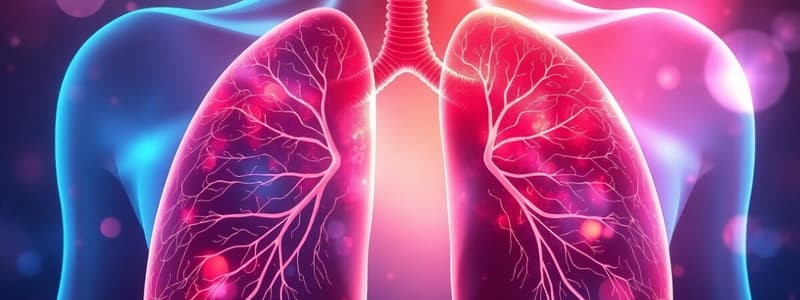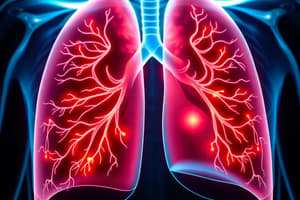Podcast
Questions and Answers
Which of the following best describes what happens to the airways during an asthma attack?
Which of the following best describes what happens to the airways during an asthma attack?
- The airways become wider and fill with fluid.
- The airways get smaller and tighter, making it hard to breathe. (correct)
- The airways become damaged due to smoking.
- The airways are blocked by a blood clot.
Pneumonia is characterized by which of the following conditions in the lungs?
Pneumonia is characterized by which of the following conditions in the lungs?
- Lungs that lose their stretchiness
- Lungs damaged because of smoking.
- Lungs with airways that get small and tight.
- Lungs filled with fluid instead of air. (correct)
What is the primary cause of COPD (Chronic Obstructive Pulmonary Disease)?
What is the primary cause of COPD (Chronic Obstructive Pulmonary Disease)?
- A dangerous infection that attacks the lungs.
- Breathing in germs from sick people.
- The airways that get small and tight.
- Damage to the lungs, most often from smoking (correct)
Which of the following is a way that tuberculosis (TB) is spread?
Which of the following is a way that tuberculosis (TB) is spread?
What happens during sleep apnea?
What happens during sleep apnea?
What does a CPAP machine do for someone with sleep apnea?
What does a CPAP machine do for someone with sleep apnea?
What is the immediate need for someone experiencing a pulmonary embolism (PE)?
What is the immediate need for someone experiencing a pulmonary embolism (PE)?
Why is drinking water helpful for respiratory health?
Why is drinking water helpful for respiratory health?
Which is a way to help keep your lungs strong?
Which is a way to help keep your lungs strong?
Which action will damage your lungs?
Which action will damage your lungs?
Flashcards
What do lungs do?
What do lungs do?
Your lungs help you breathe in oxygen and breathe out carbon dioxide, they act like balloons.
What happens during Asthma?
What happens during Asthma?
The airways (tubes inside your lungs) get small and tight, which makes it hard to breathe.
What is Pneumonia?
What is Pneumonia?
Germs (bacteria or viruses) infect the lungs, lungs fill with yucky fluid instead of air.
What is COPD?
What is COPD?
Signup and view all the flashcards
What is Tuberculosis (TB)?
What is Tuberculosis (TB)?
Signup and view all the flashcards
What is Sleep Apnea?
What is Sleep Apnea?
Signup and view all the flashcards
What is Pulmonary Embolism (PE)?
What is Pulmonary Embolism (PE)?
Signup and view all the flashcards
What are air sacs?
What are air sacs?
Signup and view all the flashcards
What to do to keep lungs healthy?
What to do to keep lungs healthy?
Signup and view all the flashcards
Study Notes
- Lungs help breathe in oxygen and breathe out carbon dioxide, like balloons filling when inhaling and releasing when exhaling.
- Lungs have tiny air sacs (alveoli) that help move oxygen into the blood.
- Mucus or fluid in the air sacs makes it hard to breathe.
Asthma
- Airways become small and tight, making it hard to breathe.
- Signs include coughing, wheezing (whistling sound), and feeling out of breath.
- Causes: Dust, pollen, cold air, exercise, or stress.
- Treatment: Inhalers open airways.
Pneumonia
- Germs (bacteria or viruses) infect the lungs
- Lungs fill with yucky fluid instead of air.
- Signs: Fever, cough with yellow or bloody mucus, and trouble breathing.
- Treatment: Rest, lots of water, and sometimes antibiotics.
COPD (Chronic Obstructive Pulmonary Disease)
- Lungs are damaged, usually from smoking making it hard to breathe out air.
- Emphysema ("Pink Puffer"): Lungs lose their stretchiness.
- Chronic Bronchitis ("Blue Bloater"): Lungs make too much mucus.
- Signs of COPD include cough, tiredness, and wheezing.
- Treatment- Stop smoking, oxygen therapy, and medicine
Tuberculosis (TB)
- Tuberculosis (TB) is a dangerous infection that attacks the lungs.
- Signs: Coughing for weeks, fever, weight loss, and night sweats.
- Spread by: Breathing in germs from sick people.
- Treatment: Special antibiotics for 6-12 months.
Sleep Apnea
- Breathing stops for a few seconds while sleeping.
- Signs: Snoring and feeling super tired in the morning.
- Causes: Being overweight, big tonsils, or weak throat muscles.
- Treatment: CPAP machine blows air into the throat to keep it open.
Pulmonary Embolism (PE)
- A blood clot blocks an artery in the lungs needing fast treatment.
- Signs: Sudden chest pain, trouble breathing, and coughing blood.
- Treatment: Blood thinners stop clots.
What to do
- Don't smoke – It damages lungs.
- Drink water – It keeps mucus thin.
- Wash hands – Avoid germs.
- Breathe fresh air – Stay away from pollution.
- Exercise - Keep lungs strong!
Studying That Suits You
Use AI to generate personalized quizzes and flashcards to suit your learning preferences.




